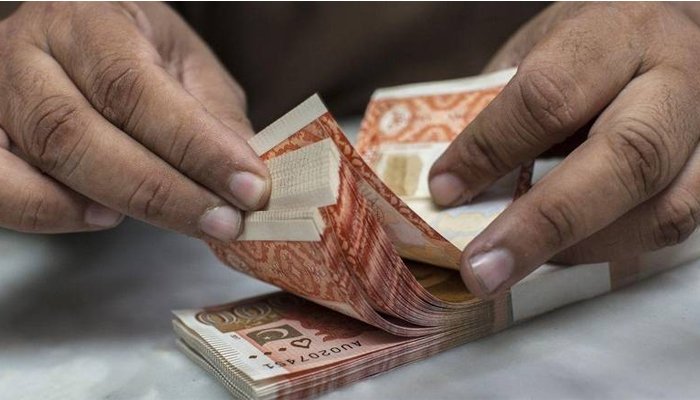Rupee greets Dar by surging against dollar
In the open market, the local unit gained 2.82 percent or 6.90 rupees against the dollar
KARACHI: The rupee rose on Monday following reports Ishaq Dar, who is well known for favouring a stronger currency, will be taking over as finance minister, and analysts predicted that the incoming finance minister would have to focus on improving foreign reserves, reducing inflation and stabilising the rupee.
In the open market, the local unit gained 2.82 percent or 6.90 rupees against the dollar. It ended at 237.50 to the dollar, compared with 244.40 in the previous session.
The domestic currency rose 2.63 rupees or 1.11 percent to 237.02 per dollar at the close in the interbank market. However, the other currencies in emerging markets continued to be battered by a strong dollar.The rupee was among worst performers in Asia, plunging 25.53 percent against the greenback so far this year. The government’s efforts to stabilise the rupeehave done nothing to halt its steep slide. It has tumbled 7.71 percent this month.
However, the investors turned optimistic about the outlook for the rupee and the currency one the news that the finance minister Miftah Ismail stepped down from his post and the senior PMLN leader Ishaq Dar would return to Pakistan to take charge as new finance minister came, according to the currency dealers.
“Dar optimism helped exporters to sell the greenback in the market, leading to the rise in the rupee,” said a dealer. Fahad Rauf, the head of research at Ismail Iqbal Securities attributed a fresh appreciation in the rupee to the sudden improvement in the market sentiment as people have memories of stable rupee during last Dar era. “The dollar is crushing global currencies, while our foreign exchange reserve position is far from comfortable. Thus, any sustainable rally in rupee does not seem likely in current scenario. The situation in global and Pakistan’s economy is not isolated, thus change of finance ministers would not do any magic,” Rauf added. “We need to keep taking tough economic measures to stabilise the economy,” Rauf suggested.
The expectations of dollar inflows from international lending institutions to support Pakistan’s relief and reconstruction efforts in the wake of the catastrophic floods that have hit the country and the decline oil prices also helped to prevent the rupee from hitting a record low during the last week.
“Few developments over weekend are helping stocks and PKR. Falling global oil prices, more pledges from international donors for floods and perception that Mr. Dar may be able to control economic issues,” said Mohammed Sohail, CEO at Topline Securities.
Analysts and the markets are looking at how Dar will step into the eye of the storm roiling the Pakistan’s economy as he is the chief defender of keeping the overvalued currency. “Managing inflation and the rupee would be the biggest challenges for the new finance minister, including negotiating any debt relief with the IMF and other multilateral creditors,” said Mustafa Mustansir, the head of research at Taurus Securities.
The rupee was on a declining trend, despite a receipt of a $1.1 billion loan tranche from the International Monetary Fund early this month. However, the additional inflows from the Middle East nations have not been materialised yet.
The outgoing finance minister Miftah Ismail claimed to have saved the nation from the brink of default, but the rupee has fallen to record lows and inflation has surpassed 27 percent as a result of negative market reactions.
Inflation increased and the rupee continued to decline as a result of unpopular moves Ismail made to comply with the IMF’s requirements, such as cutting back gasoline and electricity subsidies that Khan had provided during his final weeks in office.
The floods are thought to have cost the country close to $30 billion, and it is currently experiencing a fast depletion of the forex reserves.
-
 King Charles, Princess Anne, Prince Edward Still Shield Andrew From Police
King Charles, Princess Anne, Prince Edward Still Shield Andrew From Police -
 US Set To Block Chinese Software From Smart And Connected Cars
US Set To Block Chinese Software From Smart And Connected Cars -
 Carmen Electra Says THIS Taught Her Romance
Carmen Electra Says THIS Taught Her Romance -
 Leonardo DiCaprio's Co-star Reflects On His Viral Moment At Golden Globes
Leonardo DiCaprio's Co-star Reflects On His Viral Moment At Golden Globes -
 SpaceX Pivots From Mars Plans To Prioritize 2027 Moon Landing
SpaceX Pivots From Mars Plans To Prioritize 2027 Moon Landing -
 King Charles Still Cares About Meghan Markle
King Charles Still Cares About Meghan Markle -
 J. Cole Brings Back Old-school CD Sales For 'The Fall-Off' Release
J. Cole Brings Back Old-school CD Sales For 'The Fall-Off' Release -
 GTA 6 Built By Hand, Street By Street, Rockstar Confirms Ahead Of Launch
GTA 6 Built By Hand, Street By Street, Rockstar Confirms Ahead Of Launch -
 Funeral Home Owner Sentenced To 40 Years For Selling Corpses, Faking Ashes
Funeral Home Owner Sentenced To 40 Years For Selling Corpses, Faking Ashes -
 Why Is Thor Portrayed Differently In Marvel Movies?
Why Is Thor Portrayed Differently In Marvel Movies? -
 Dutch Seismologist Hints At 'surprise’ Quake In Coming Days
Dutch Seismologist Hints At 'surprise’ Quake In Coming Days -
 Australia’s Liberal-National Coalition Reunites After Brief Split Over Hate Laws
Australia’s Liberal-National Coalition Reunites After Brief Split Over Hate Laws -
 DC Director Gives Hopeful Message As Questions Raised Over 'Blue Beetle's Future
DC Director Gives Hopeful Message As Questions Raised Over 'Blue Beetle's Future -
 King Charles New Plans For Andrew In Norfolk Exposed
King Charles New Plans For Andrew In Norfolk Exposed -
 What You Need To Know About Ischemic Stroke
What You Need To Know About Ischemic Stroke -
 Shocking Reason Behind Type 2 Diabetes Revealed By Scientists
Shocking Reason Behind Type 2 Diabetes Revealed By Scientists




